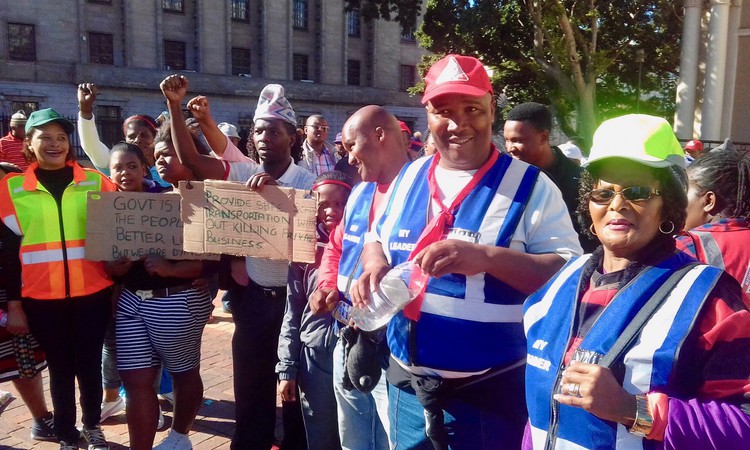Bakkie drivers protest against law banning lifts to learners
They say they’re needed because school transport is a shambles
People who transport school learners in the Eastern Cape are angry that the National Road Traffic Act prohibits them from transporting students on the back of a bakkie. They want government to provide them with alternatives, such as vehicle finance, instead of closing them down.
Last Tuesday at City Hall, Port Elizabeth, dozens of members of Nelson Mandela Bay Transport Services (NMBTS) vowed to continue using their vehicles. NMBTS is an organisation that represents bakkie operators transporting learners in the metro.
A memorandum was received by Sarah Baartman District public transport manager Mthuthuzeli Siwa on behalf of district manager Phakamisa Mente for delivery to the provincial MEC for transport Weziwe Tikana.
NMBTS spokesperson Xolisile Ntantiso said: “We have no other form of earning an income. We are not against what the government is saying, but we need to sit down first and discuss this issue … Some of our members used their pension money to buy their bakkies, while others got loans.”
“We have the full support of the parents whose children we transport. They are here with their children taking part in the protest,” he said.
“Government has acknowledged our existence and importance in helping poor children go to school. Why can’t they now help us grow this business?” asked Ntantiso.
Maria Mills, a parent from Gelvandale, said, “We have no choice because the government’s scholar transport is a shambles. I want my children to be at school on time. The bakkie fetches my children from my house and drops them at the school gate. The same vehicle brings them back home without the threat of them being robbed by criminals.”
Mills pays R800 a month for her two daughters to be transported to school in Kabega Park.
Mkhulili Lamani uses his bakkie to transport learners from Wells Estate and Motherwell to schools in Kostern. He said he would be out of business if his bakkie is banned from the road.
“I am not working and it is very tough to look after my wife and my child. The bakkie has been our only source of income,” he said. “We are not resisting the government’s moves to regulate this industry. Our plea to them is they should bring an alternative type of vehicle. I am prepared to get a loan from them for a better vehicle and remain in the business.”
Motherwell resident Sipho Jacobs also drives a bakkie. “The scholar transport in this province is poorly administered. We are playing a very important role by transporting children to their respective schools … We are also angered by the police who fine us an exorbitant R7,000 if found to be a repeat offender. They even impound your vehicle.”
Nelson Mandela Bay Municipality Mayoral Committee Member for Transport Councillor John Best said, “The law is not about taking them out of business but it is about the safety of children. Our officers will definitely apply this law because it is a regulation that went through the national Parliament and every police officer in the whole country is mandated to enforce it.”
Spokesperson for the Eastern Cape Department of Transport Khuselwa Rantjie said, “We will embark on a roadshow educating people. The main emphasis is on transporting school children. A bakkie, by law, is not allowed to do that.”
“Bakkies also fall short on safety features. They need to have seat belts for every passenger at the back and should have comfortable seats. Every public transport vehicle should have an emergency exit for easy escaping during an accident,” she said.
Support independent journalism
Donate using Payfast

Don't miss out on the latest news
We respect your privacy, and promise we won't spam you.
© 2017 GroundUp. 
This article is licensed under a Creative Commons Attribution-NoDerivatives 4.0 International License.
You may republish this article, so long as you credit the authors and GroundUp, and do not change the text. Please include a link back to the original article.

